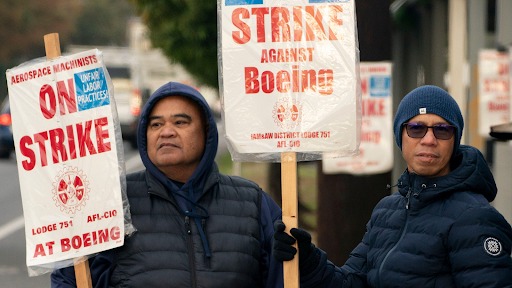Boeing employees accepted the company’s most recent compensation offer, ending a seven-week boycott.
Over the next four years, they will receive a 38% salary increase under the new deal.
According to the International Association of Machinists and Aerospace Workers (IAM) union, striking employees may resume work as early as Wednesday or as late as November 12.
Beginning on September 13, some 30,000 Boeing employees began to walk out, which caused a sharp delay at the aircraft manufacturer’s plants and exacerbated the company’s predicament.
According to IAM, 59% of striking employees supported the new agreement, including adjustments to the workers’ retirement plans and a one-time incentive of $12,000 (£9,300).
“Through this victory and the strike that made it possible, IAM members have taken a stand for respect and fair wages in the workplace,” said Jon Holden, the union’s leader.
Workers had previously turned down two proposals from the corporation, and the union had demanded a 40% salary raise.
“Even though the last few months have been challenging for all of us, we are all on the same team,” stated Kelly Ortberg, the CEO of Boeing.
“There is much work ahead to return to the excellence that made Boeing an iconic company.”
Last month, acting US Labour Secretary Julie Su went to Seattle to assist in discussions, demonstrating how seriously the White House viewed the strike at one of the nation’s most significant firms.
According to consulting firm Anderson Economic Group, Boeing has been attempting to stabilise its finances and end the strike, which has now cost it close to $10 billion.
For the three months ending in September, the commercial aircraft division recorded operational losses of $4 billion in October.
The company started selling shares last week to raise almost $20 billion.
It followed warnings that a protracted strike would result in Boeing’s credit rating being downgraded, increasing the cost of borrowing money.



